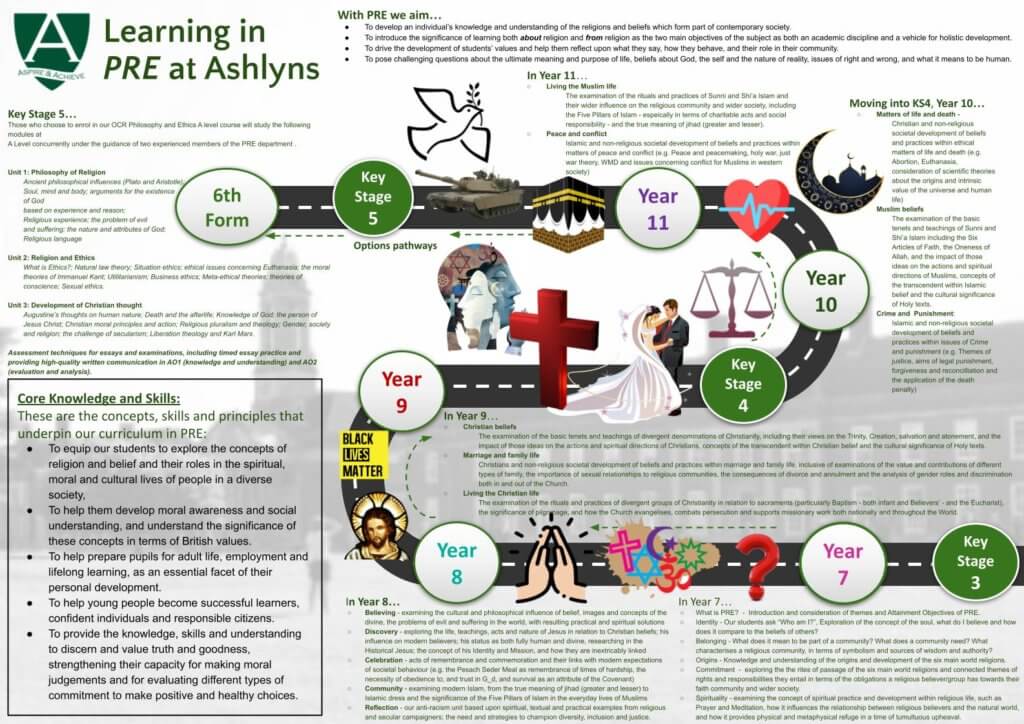Philosophy, Religion & Ethics
At Ashlyns, we strive to provide an engaging, diverse and dynamic educational experience for students of all faiths and none through the study of philosophical, religious and ethical concepts. Our PRE curriculum allows our students to explore challenging questions about the ultimate meaning and purpose of life, belief in God, the nature of reality, issues of right and wrong and what it means to be human. In doing so, it enhances their awareness and understanding of religious beliefs, practices and forms of expression, as well as the influence of faith on individuals, communities, families and cultures.

Students are encouraged to explore their own beliefs and ask questions about meaning; develop skills of analysis and evaluation; personal development and discernment to recognise and combat prejudice and discrimination in all its forms; develop their sense of community and belonging; flourish both personally and as part of a pluralistic, global community; and prepare for adult life, employment and lifelong learning by promoting respect and sensitivity for beliefs and practices that differ from their own.
Key Stage 3
Our new Year 7 students will focus on the skills of learning about and from the six main religions – Buddhism, Christianity, Hinduism, Islam, Judaism and Sikhism – whilst also exploring non-religious views on matters of spirituality. Their curriculum is delivered within different themes: Identity (Who we are and what makes us unique), Belonging (What it means to be a faith community), Origins (How did faith communities begin and spread?), Commitment (understanding Rites of Passage within faith communities), and Spirituality (what it is to experience the divine).
In Year 8, students will expand upon their previous learning and tackle new themes relating to the effect of religious and cultural action upon the world: Believing (Aspects of faith, such as imagery and ultimate questions), Discovery (The life of Jesus and its major influence on the world), Authority (what it means to be a good moral leader), Celebration (exploring religious festivals and acts of remembrance), Community (a comprehensive exploration of modern Islam) and our Reflection theme, which is based around discussing Anti-racism in the modern day, and how our pupils can put it into action in their everyday lives.
Key Stage 4
All students at Ashlyns are entered for the fully Edexcel GCSE in Religious Studies at the beginning of Year 9, where they will take two examination papers at the end of Year 11. The course is based upon the study of Christianity (Paper 1) and Islam (Paper 2).
In Year 9, our students will explore the first three units of their course in relation to Islam and non-religious viewpoints, beginning with Paper 2 content. These units are Muslim beliefs (the diverse teachings and beliefs of modern Islam), Crime and punishment (exploring issued concerning law and justice, the aims of punishment and the death penalty), and Living the Muslim life (learning about and understanding the significance of Islamic practices in the modern world)
When our students enter Year 10, they will explore the next three units, where they will complete their Paper 2 (Islam) content by exploring Peace and conflict (concepts of peacemaking, the justice of war and reconciliation). They will then commence their Paper 1 content by studying a further two units in relation to Christian and non-religious views. These units will be Christian beliefs (the diverse teachings and beliefs of modern Christianity) and Marriage and the family (looking at matters of marriage, divorce, sexual relationships and gender equality).
In their final year of GCSE, Year 11 students will complete their Paper 1 (Christianity) content by studying the final two units: Living the Christian life (learning about and understanding the significance of Christian practices in the modern world) and Matters of life and death (such as the origin and value of human life, abortion, euthanasia and issues concerning the natural world). They will then undergo guided, targeted and intensive revision and review sessions to fully prepare them for the rigours of their GCSE RS examination, providing them with the knowledge, understanding and the techniques to succeed.
Key Stage 5
At KS5, those who choose to enrol in our OCR Philosophy and Ethics A level course will gain a detailed and comprehensive understanding of the fascinating issues, concepts and dilemmas that have occupied great thinkers for hundreds – if not thousands of years! This academic and rigorous course promotes a true understanding of the philosophical and moral influence of Christian thought, as well as the finest contributions of secular thinkers throughout Western history.
Students will study the following modules at A Level concurrently under the guidance of three experienced members of the PRE department. At the end of Year 13, students will take three written examinations in each of the three units detailed below. The course is 100% examination.
Unit 1: Philosophy of Religion
Ancient philosophical influences (Plato and Aristotle); Soul, mind and body; arguments for the existence of God based on experience and reason; Religious experience; the problem of evil and suffering; the nature and attributes of God; Religious language (both classic and 20th century treatments and arguments).
Unit 2: Religion and Ethics
What is Ethics?; Natural law theory; Situation ethics; ethical issues concerning Euthanasia; the moral theories of Immanuel Kant; Utilitarianism; Business ethics; Meta-ethical theories; theories of conscience; Sexual ethics.
Unit 3: Development of Christian thought
Augustine’s thoughts on human nature; Death and the afterlife; Knowledge of God; the person of Jesus Christ; Christian moral principles and action; Religious pluralism and theology; Gender, society and religion; the challenge of secularism; Liberation theology and Karl Marx.

